第4课日译汉课件
日译汉课件第14课
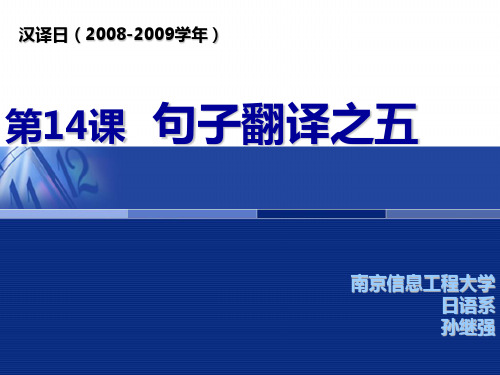
句子变通— 句子变通—转译
例1 实际行动, 原文: 原文:世界上最有力的论证莫如实际行动,最有 以身作则。 效的教育莫如以身作则。 提示:论证→論証;莫如→ ぶものはない; 提示:论证→論証;莫如→~及ぶものはない;以 身作则→手本を 身作则→手本を示す 訳文:世界でもっとも有力な論証は実際に行動する でもっとも有力 訳文:世界でもっとも有力な論証は実際に行動する ことに及ぶものはなく、もっとも有効 教育は 有効な ことに及ぶものはなく、もっとも有効な教育は身を もって手本 手本を すこと以上のものはない。 以上のものはない もって手本を示すこと以上のものはない。 分析:原文中的两个“莫如”为了避免重复, 分析:原文中的两个“莫如”为了避免重复,前 后使用了不同的表达方式。 后使用了不同的表达方式。汉语中同一词语的重 复表达方式可能会加强语言表现力, 复表达方式可能会加强语言表现力,而日语则不 然,应尽量避免重复。 应尽量避免重复。
句子变通— 句子变通—改译
例5 原文:软件开发方面, 原文:软件开发方面,中日是站在同一起跑线上 但在硬件制造方面, 的,但在硬件制造方面,日本是世界上数一数二 今后这一领域的合作会增加。 的,今后这一领域的合作会增加。 提示:软件→ソフトウェア;起跑线→スタートライン; 提示:软件→ソフトウェア;起跑线→スタートライン; 硬件→ハードウェア;数一数二→ 硬件→ハードウェア;数一数二→一、二を争う 訳文:ソフトウェアの開発では、中日両国が 開発では 訳文:ソフトウェアの開発では、中日両国が同じス タートラインに立っているが、ハードウェア製造 製造の タートラインに立っているが、ハードウェア製造の面 では日本 世界において 日本は において一 うものなので、 では日本は世界において一、二を争うものなので、 今後この分野における協力が えるだろう。 この分野における協力 今後この分野における協力が増えるだろう。
第3课日译汉课件
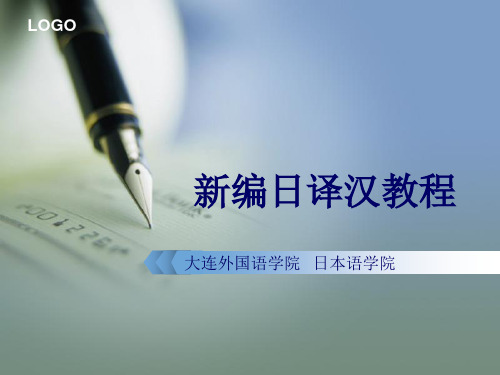
Company Logo
2貌似相同却不同
「全くあの子には呆れているんですよ。わ くあの子には呆れているんですよ。 たしのいうことなんか一つもきかないし, たしのいうことなんか一つもきかないし,ね さん,うちの子 え,お神さん,うちの子はどうしてああなん でしょう?それに何しろうちの人 兄弟は でしょう?それに何しろうちの人の兄弟は, みんな手癖 手癖が いんで,あの子もうちの人 みんな手癖が悪いんで,あの子もうちの人の たんですよ。……」 方の血に似たんですよ。……」 (“那孩子真叫我伤心呐!我的话他一句也 那孩子真叫我伤心呐! 不听。 你说说,这孩子怎么会这样的? 不听。啊!你说说,这孩子怎么会这样的?这不 怪别的,老头子他们弟兄手脚都不老实, 怪别的,老头子他们弟兄手脚都不老实,这孩 子是随根罗!……) 子是随根罗!……) !……
Company Logo
3轻率推理歧义生
それからやがて夜になって, それからやがて夜になって,あまど をしめるとき見ると,その幕舍 幕舍の をしめるとき見ると,その幕舍の立っ ていたあたりで,だれかが七輪 七輪をあお ていたあたりで,だれかが七輪をあお いでいるらしく,无数の火花のうず のうず卷 いでいるらしく,无数の火花のうず卷 暗黑の空中に飛散していた していた。 が暗黑の空中に飛散していた。 (一到夜里,再打开窗子望去,在那 一到夜里,再打开窗子望去, 小窝棚附近, 小窝棚附近,可以看到好像有什么人在 扇着陶炉,无数的、 扇着陶炉,无数的、漩涡般的火花飞散 在夜空里。) 在夜空里。)
Company Logo
第一部分 日语汉字词同汉语简单比较
1形义皆同 汉语简化字与日语的繁体字视为同形。 (汉语简化字与日语的繁体字视为同形。 这里只列日语) 这里只列日语) 2形同义异 (1)意义完全不同的 意义完全不同的: (1)意义完全不同的: (2)意义部分不同的 意义部分不同的: (2)意义部分不同的: 3形异义同 4日语独特的汉字词 (1)用汉字自造的 用汉字自造的: (1)用汉字自造的: (2)自造的汉字 (2)自造的汉字
高级英语第4课Inaugural Address 课件 翻译 译文
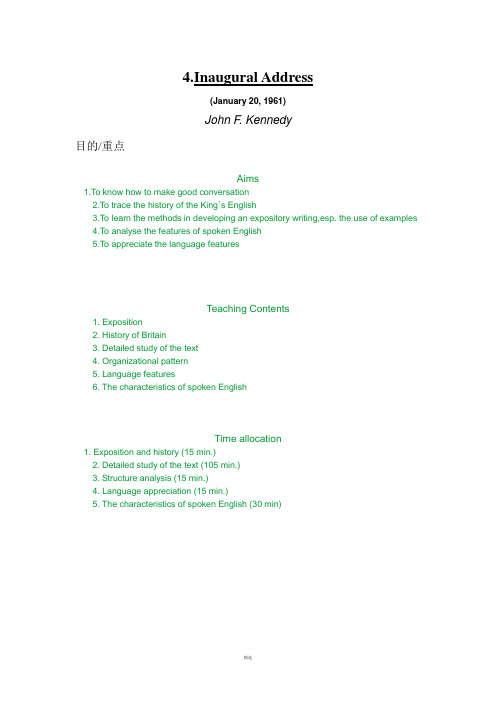
4.Inaugural Address(January 20, 1961)John F. Kennedy目的/重点Aims1.To know how to make good conversation2.T o trace the history of the King’s English3.T o learn the methods in developing an expository writing,esp. the use of examples4.T o analyse the features of spoken English5.T o appreciate the language featuresTeaching Contents1. Exposition2. History of Britain3. Detailed study of the text4. Organizational pattern5. Language features6. The characteristics of spoken EnglishTime allocation1. Exposition and history (15 min.)2. Detailed study of the text (105 min.)3. Structure analysis (15 min.)4. Language appreciation (15 min.)5. The characteristics of spoken English (30 min)课文内容4. Inaugural Address(January 20, 1961)John F. Kennedy1 We observe today not a victory of party but a celebration of freedom, symbolizing an end as well as a beginning, signifying renewal as well as change. For I have sworn before you and Almighty God the same solemn oath our forebears prescribed nearly a century and three-quarters ago.2 The world is very different now. For man holds in his mortal hands the power to abolish all forms of human poverty and all forms of human life. And yet the same revolutionary belief for which our forebears fought is still at issue around the globe, the belief that the rights of man come not from the generosity of the state but from the hand of God.3 We dare not forget today that we are the heirs of that first revolution. Let the word go forth from this time and place, to friend and foe alike, that the torch has been passed to a new generation of Americans, born in this century, tempered by war, disciplined by a hard and bitter peace, proud of our ancient heritage, and unwilling to witness or permit the slow undoing of these human rights to which this nation has always been committed, and to which we are committed today at home and around the world.4 Let every nation know, whether it wishes us well or i11, that we shall pay any price, bear any burden, meet any hardship, support any friend, oppose any foe to assure the survival and the success of liberty.5 This much we pledge--and more.6 To those old allies whose cultural and spiritual origins we share, we pledge the loyalty of faithful friends. United, there is little we cannot do in a host of co-operative ventures. Divided, there is little we can do, for we dare not meet a powerful challenge at odds and split asunder.7 To those new states whom we welcome to the ranks of the free, we pledge our word that one form of colonial control shall not have passed away merely to be replaced by a far more iron tyranny. We shall not always expect to find them supporting our view. But we shall always hope to find them strongly supporting their own freedom, and to remember that, in the past, those who foolishly sought power by riding the back of the tiger ended up inside.8 To those peoples in the huts and villages of half the globe struggling to break the bonds of mass misery, we pledge our best efforts to help them help themselves, for whatever period is required, not because the Communists may be doing it, not because we seek their votes, but because it is right. If a free society cannot help the many who are poor, it cannot save the few who are rich.9 To our sister republics south of our border, we offer a special pledge: to convert our good words into good deeds, in a new alliance for progress, to assist free men and free governments in casting off the chains of poverty. But this peaceful revolution of hope cannot become the prey of hostile powers. Let all our neighbors know that we shall join with them to oppose aggression or subversion anywhere in the Americas. And let every other power know that this hemisphere intends to remain the master of its own house.10 To that world assembly of sovereign states, the United Nations, our last best hope in an age where the instruments of war have far outpaced the instruments of peace, we renew our pledge of support: to prevent it from becoming merely a forum for invective, to strengthen its shield of the new and the weak, and to enlarge the area in which its writ may run.11 Finally, to those nations who would make themselves our adversary, we offer not a pledge but a request: that both sides begin anew the quest for peace, before the dark powers of destruction unleashed by science engulf all humanity in planned or accidental self-destruction.12 We dare not tempt them with weakness. For only when our arms are sufficient beyond doubt can we be certain beyond doubt that they will never be employed.13 But neither can two great and powerful groups of nations take comfort from our present course--both sides overburdened by the cost of modern weapons, both rightly alarmed by the steady spread of the deadly atom, yet both racing to alter that uncertain balance of terror that stays the hand of mankind's final war.14 So let us begin anew, remembering on both sides that civility is not a sign of weakness, and sincerity is always subject to proof. Let us never negotiate out of fear, but let us never fear to negotiate.15 Let both sides explore what problems unite us instead of belaboring those problems which divide us.16 Let both sides, for the first time, formulate serious and precise proposals for the inspection and control of arms and bring the absolute power to destroy other nations under the absolute control of all nations.17 Let both sides seek to invoke the wonders of science instead of its terrors. Together let us explore the stars, conquer the deserts, eradicate disease, tap the ocean depths and encourage the arts and commerce.18 Let both sides unite to heed in all corners of the earth the command of Isaiah to "undo the heavy burdens...(and) let the oppressed go free".19 And if a beachhead of co-operation may push back the jungle of suspicion, let both sides join in creating a new endeavor, not a new balance of power, but a new world of law, where the strong are just and the weak secure and the peace preserved.20 All this will not be finished in the first one hundred days. Nor will it be finished in the first one thousand days, nor in the life of this Administration, nor even perhaps in our lifetime on this planet. But let us begin.21 In your hands, my fellow citizens, more than mine, will rest the final success or failure of our course. Since this country was founded, each generation of Americans has been summoned to give testimony to its national loyalty. The graves of young Americans who answered the call to service surround the globe.22 Now the trumpet summons us again--not as a call to bear arms, though arms we need; not as a call to battle, though embattled we are; but a call to bear the burden of a long twilight struggle, year in and year out, "rejoicing in hope, patient in tribulation," a struggle against the common enemies of man: tyranny, poverty, disease and war itself.23 Can we forge against these enemies a grand and global alliance, North and South, East and West, that can assure a more fruitful life for all mankind? Will you join in the historic effort?24 In the long history of the world, only a few generations have been granted the role of defending freedom in its hour of maximum danger. I do not shrink from this responsibility; I welcome it. I do not believe that any of us would exchange places with any other people or any other generation. The energy, the faith, the devotion which we bring to this endeavor will light our country and all who serve it, and the glow from that fire can truly light the world.25 And so, my fellow Americans ask not what your country can do for you; ask what you can do for your country.26 My fellow citizens of the world, ask not what America will do for you, but what together we can do for the freedom of man.27 Finally, whether you are citizens of America or citizens of the world, ask of us here the same high standards of strength and sacrifice which we ask of you. With a good conscience our only sure reward, with history the final judge of our deeds, let us go forth to lead the land we love, asking His blessing and His help, but knowing that here on earth God's work must truly be our own.(from A Treasury of the World's Great Speeches, 1965)NOTES1. inaugural address: since 1937, Inauguration Day has been changed to Jan. 20. On this day every four years the newly elected president of the United States faces the people for the first time, takes the presidential oath of office and delivers his inaugural address.2. solemn oath: the presidential oath, traditionally administered by the Chief Justice, is prescribed in Article II, section 1 of the Constitution of the United States. The oath runs as follows: "I do solemnly swear (or affirm) that I will faithfully execute the Office of President of the United States, and will to the best of my ability, preserve, protect and defend the Constitution of the United States. "3. The belief that the rights of man.., hand of God: refers to a passage in the American Declaration of Independence: "We hold these truths to be self-evident, that all men are created equal, that they are endowed by their Creator with certain unalienable Rights, that among these are Life, Liberty and the pursuit of Happiness. "4. command of Isaiah: one of the greatest Hebrew prophets whose writings are extant (late 8th century B. C. ) ; venerated by rabbis as 2nd only to Moses. The Book of Isaiah, a book in the Old Testament of the Bible of the Christian, is believed to be a work of two authors of different periods; chapters 1--39 relate to the history of the Israelites; chapters 40--66 foretell the coming of the Messiah. The quotation in the text is taken from chapter 58, verse 6: "Is not this the fast that I have chosen? to loose the bands of wickedness, to undo the heavy burdens, and to let the oppressed go free, and that ye break every yoke?"教学教案背景知识课文详解文章结构修辞学习课文录像课文录音词汇短语词汇(Vocabulary): of an inauguration就职(典礼)的----------------------------------------------------------------------------------: be a sign or indication of;mean表明;意味----------------------------------------------------------------------------------: having unlimited power;all—powerful有无限权力的;全能的----------------------------------------------------------------------------------: an ancester 祖先,祖宗----------------------------------------------------------------------------------: set down as a rule or direction;order;ordain;direct命令;指示;规定,订立----------------------------------------------------------------------------------: the quality of being generous慷慨;宽宏大量----------------------------------------------------------------------------------: person who appears to get some trait from a predecessor or seems to carry on in his tradition继承者;后嗣----------------------------------------------------------------------------------: enemy;opponent敌人----------------------------------------------------------------------------------: the act of bringing to ruin,disgrace,or destruction毁灭;破坏----------------------------------------------------------------------------------: in disagreement;quarreling意见不一致;有争执----------------------------------------------------------------------------------: into parts or pieces分成碎片;分散----------------------------------------------------------------------------------: a person or thing that falls victim to someone or something牺牲品;掠夺品----------------------------------------------------------------------------------: a subverting or being subverted.ruin 颠覆(活动);破坏----------------------------------------------------------------------------------: independent of all others独立自主的----------------------------------------------------------------------------------: surpass;exceed在速度上超过;胜过----------------------------------------------------------------------------------: a violent verbal attack.strong criticism,insults, curses, etc.; vituperation 抨击;辱骂,谩骂----------------------------------------------------------------------------------: any person or thing that guards,protects,or defends; protection保护人;防护物;保护----------------------------------------------------------------------------------: a formal legal document ordering or prohibiting some action命令;律令;文书;传票----------------------------------------------------------------------------------: a person who opposes or fights against another; opponent;enemy对手,反对者;敌手,敌方----------------------------------------------------------------------------------: again重新,再----------------------------------------------------------------------------------: release from or as from a leash(解开皮带以)释放----------------------------------------------------------------------------------: swallow up;overwhelm 吞没,淹没,压倒----------------------------------------------------------------------------------: politeness.esp. in a merely formal way 礼貌,客气----------------------------------------------------------------------------------: talk about at unnecessary length唠唠叨叨地反复讲----------------------------------------------------------------------------------: put together and express (a theory.plan ,etc.)a systematic way系统地阐述(或提出)(理论、计划等)----------------------------------------------------------------------------------: draw upon;make use of开发、发掘----------------------------------------------------------------------------------: pay close attention to;take careful notice of注意, 留神,留心----------------------------------------------------------------------------------: a position established by invading troops on an enemy shore;a position gained as a secare starting point for any action;foothold滩头堡,登陆场;立足点----------------------------------------------------------------------------------: an earnest attempt or effort努力,尽力----------------------------------------------------------------------------------: any form of evidence,indication. etc.;proof证明,证据----------------------------------------------------------------------------------: [常用于被动语态]prepare,array,or set in line for battle使准备战斗,使严阵以待----------------------------------------------------------------------------------: great misery or distress, as from oppression;deep sorrow苦难;困苦;忧伤----------------------------------------------------------------------------------: move forward steadily,as if against difficulties; form;produce(似乎迎着困难)稳步前进;形成;结成----------------------------------------------------------------------------------: a close association for a common objective as of nations,political parties,etc.联盟,联合,同盟----------------------------------------------------------------------------------短语(Expressions): in dispute;to be decided;at variance;in disagreement意见不一致例:What is at issue is the extent to which exam results reflect a student’s ability.意见的分歧之处在于考试对于学生能力的影响程度。
日汉翻译概述PPT课件

雨で道が濡れました。
そのニュースは新聞で知った。
ここの村では、五十年前ごろには群馬県の農家からこ んにゃくの注文をうけたものである。
この本は、外国人で、日本語を学習しようとする者に対
して、その学習活動を効果的にする目的で編集した
ものである。
30
• 工場で働くだけの金を取らなければならない。 • 一日休めばそれだけの損になる。 • 彼は出ていけといわんばかりに安子を虐待した。 • 彼は若いながら、経験がとても豊富だ。 • これ以上議論したところで、ますます混乱するばかり
32
写在最后
成功的基础在于好的学习习惯
The foundation of success lies in good habits
33
谢谢大家
荣幸这一路,与你同行
It'S An Honor To Walk With You All The Way
讲师:XXXXXX XX年XX月XX日
34
第1讲 日汉翻译概述
1
• 课程成绩(100%) =期末成绩(60%)+平时成绩(40%) (作业和测验 课堂讨论 纪律 )
2
翻译的定义和种类
3
“翻译”
• 翻:翻也者,如翻锦绮,背面俱花,但其花 有左右耳。
• 译:译即易也,谓换易语言,使相解也。 • 翻译:把某种语言表达的思想内容,用另一
种语言表达出来的过程或结果,是在不同语 言之间进行沟通的语言活动。 • 日译汉:用汉语复现日语的内容。
语,其主语一般均为第一人称。うれしい、 恋しい、思う、心配、安心、気の毒
28
☻ 分不清肯定否定 だろうか でしょうか じゃないか ではありませんか ではないでしょう せざるをえない
第4课《古代诗歌四首》教学课件(共61张PPT).ppt

观沧海
“观”字在全诗中起什么作用?
全诗以“观”字统领全篇,以下由“观”字展开,写诗人 登山的所见所思。体现了全诗意境开阔、气势雄浑的特点。
“若”字为人称道,说说好在哪里。
观沧海
两个“若”字,表明大海吞吐日月星辰的景象是诗人自己的 想象。表现出诗人宽广的胸襟、豪迈的气概以及统一天下的 雄心壮志。
• 意象赏析题目主要考查抓住关键词句,识别诗歌意象,根据体现 景物特点的关键词语、句子概括诗歌意象特点;结合诗歌主旨分 析诗人选取意象的用意;分析意象在表情达意方面方面的作用与 效果。
观
沧
曹海
操
作者介绍
曹操(155-220),字孟德,沛(pèi)国谯(qiáo)
县[今安徽亳(bó)州]人,东汉末政治家、军
闻王昌龄左迁龙标遥有此寄
文学常识:绝句 绝句,四句一首,短小精悍,是唐代流行起来的一种诗 歌体裁,以五言、七言为主,简称五绝、七绝。也有六 言绝句。《闻王昌龄左迁龙标遥有此寄》属于七言绝 句。
创作背景
闻王昌龄左迁龙标遥有此寄
《新唐书·文艺列传》载王昌龄左迁龙标尉,是因为“不护细 行”,也就是说,王昌龄被贬官,并不是由于什么重大问题,而 只是由于生活小节不够检点。李白在听到他不幸的遭遇后,写了 这首充满同情和关切的诗歌,从远方寄给了他。
闻王昌龄左迁龙标遥有此寄
闻王昌龄左迁 龙标遥有此寄
写景——杨花、子规 叙事——左迁 抒情——愁心
同情 关切
次 北 固 王山 湾下
走近作者
王湾
次北固山下
王湾,生卒年不详,洛阳(今属河南)人,唐代诗 人。唐玄宗时,官任荥阳主簿、洛阳尉等。现存 诗不多,其中较出名的是《次北固山下》《奉使 登终南山》。
中译日课程(完整资料).doc
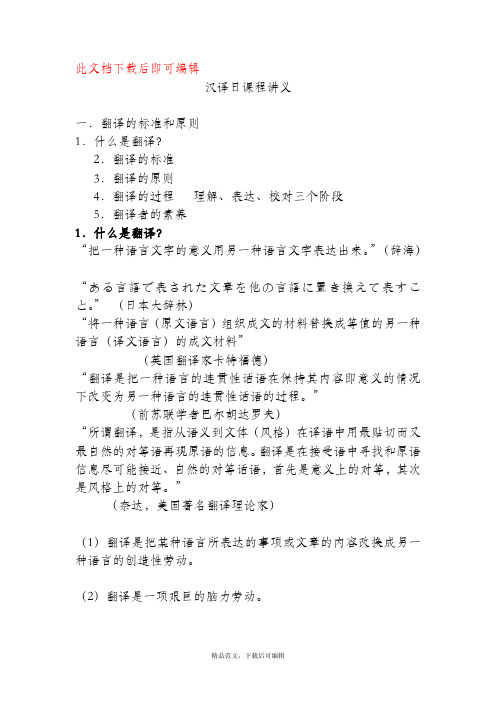
此文档下载后即可编辑汉译日课程讲义一.翻译的标准和原则1.什么是翻译?2.翻译的标准3.翻译的原则4.翻译的过程理解、表达、校对三个阶段5.翻译者的素养1.什么是翻译?“把一种语言文字的意义用另一种语言文字表达出来。
”(辞海)“ある言語で表された文章を他の言語に置き換えて表すこと。
”(日本大辞林)“将一种语言(原文语言)组织成文的材料替换成等值的另一种语言(译文语言)的成文材料”(英国翻译家卡特福德)“翻译是把一种语言的连贯性话语在保持其内容即意义的情况下改变为另一种语言的连贯性话语的过程。
”(前苏联学者巴尔胡达罗夫)“所谓翻译,是指从语义到文体(风格)在译语中用最贴切而又最自然的对等语再现原语的信息。
翻译是在接受语中寻找和原语信息尽可能接近、自然的对等话语,首先是意义上的对等,其次是风格上的对等。
”(奈达,美国著名翻译理论家)(1)翻译是把某种语言所表达的事项或文章的内容改换成另一种语言的创造性劳动。
(2)翻译是一项艰巨的脑力劳动。
(3)翻译是一项十分有意义的工作,它是沟通两个民族、两个国家之间语言障碍的桥梁。
翻译的标准▪信忠实原文,完整再现原文的内容和思想感情▪达译文通顺、流畅,无生搬硬套▪雅保持原作的风格和色彩•“信、达、雅”三者是一个密切相关的整体。
“信、达、雅”的核心是“信”。
•在忠实力面,主要存在的问题是错译和滥译。
•在通顺方面,主要的毛病是译文语病多,文字臃肿累赘,表达含糊不清,词汇贫乏,等。
中译日的基本原则▪通盘考虑,把握原文意思▪抓住主干,弄清基本骨架▪译后检查,避免漏译误译4.翻译的过程理解、表达、校对三个阶段(1)理解阶段a 正确地分析句子结构,弄清词汇的含义。
b 理解逻辑关系或前后文背景。
c 弄清典故、术语、有关的专门知识。
(2)表达阶段①直译直译在翻译中是最基本的方法。
②意译(a)对那些固有的谚语、成语、惯用语,采用意译法。
(b)某些文章(尤其是文艺作品)的句子中,虽没有固有的谚语、成语、惯用语,而由普通词汇、词组或语言现象构成,但考虑到上下文的语言背景、风格、修辞等,也应在融会贯通后进行意译。
人教部编版九年级上册语文:第4课《你是人间的四月天》(共25张PPT)省公开课获奖课件说课比赛一等奖

初读感悟
你是人间旳四月天 一一句爱旳赞颂
我说/你是人间旳/四月天; 笑响/点亮了/四面风; 轻灵在春旳光艳中/交舞着/变。 你是/四月早天里旳/云烟, 傍晚/吹着风旳软, 星子/在无意中闪, 细雨点/洒在/花前。
那轻,那娉婷,你是, 鲜妍百花旳冠冕/你戴着, 你是天真,庄重, 你是夜夜旳/月圆。 雪化后/那片鹅黄,你像; 新鲜初放芽/旳绿,你是; 柔嫩喜悦,水光浮动着你梦/期待中/白莲。 你是一树一树旳/花开, 是燕在梁间/呢喃, ——你是爱,是暖,是希望, 你是/人间旳/四月天!
板书设计
春光风舞图 风烟星雨图 月夜花开图 雪后新绿图 花开燕语图
深深旳依恋 和热爱之情
作业布置
1、反复吟诵,体会诗歌旳美。 2、查阅资料,了解林微因和新月派。
“你是一树一树旳花开,是 燕在梁间呢喃”体现了“你”旳 温柔、和暖。
细读探究
3、突出了“你”旳哪些特点?请结合详细句子来阐明。
温柔,天真、庄重、 和暖、充斥生机和希望。
精读琢磨
副标题“一句爱旳赞颂”有什么作用?
提醒了写作缘由 ,即诗人对生命旳赞颂,整首诗如笼罩在
一轮火热旳爱旳光环之中。 (本诗主旨是什么?)
拓展提升
请同学们模仿诗作中对爱旳描写, 选择合适旳意象,仿写一首小诗,体 现对父母、师长旳爱。
课堂总结
这首诗以“四月天”为喻, 选用了代表春天温 柔、和暖、充斥生机和希望旳意象,营造了美妙旳 意境,突出了“你”旳温柔、和暖、充斥生机和希 望。抒写对生命旳赞歌,体现心中对新生事物旳希 望和新事物出现旳依恋、热爱和喜悦之情。
精读琢磨
此诗语言体现上有哪些特色?先组内交流,后全班展示。
音韵美。这首诗共五节,每节三行,一、三行 押韵。字数与句式灵活多变,灵动不呆板。讲求格 律旳友好、语言旳音乐美,诗歌中词语旳跳跃和韵 律旳友好几乎到达极致。
2024秋季新教材部编版七年级上册语文第4课 古代诗歌四首课件

观沧海
曹操
作者简介 曹操(155—220),字孟德,沛
国谯县(今安徽亳州)人,东汉末政 治家、军事家、文学家。善诗歌,有 《步出夏门行》《蒿里状行元成才路 》诸篇,用乐府旧题 抒发自己的政治状抱元成才路 负,气魄雄伟,慷慨悲凉, 对汉末人民的苦难生活也有所反映。
状元成才路 状元成才路
写作背景
汉献帝建安十二年(207)八月,曹操大 破盘踞在北方边塞地区的乌桓族及袁绍的残余 势力,基本统一了北方;九月,他在归途中经 过碣石山,面对洪波涌起的大海,触景生情, 写下了这首壮丽的诗篇。
闻王昌龄左迁龙标遥有此寄
李白
作者简介
李白(701—762),字太白,号青
莲居士,唐代伟大的浪漫主义诗人,
被后世誉为“诗仙”,与杜甫合称
“李杜”。其诗豪放飘逸,想象丰富,
状元成才路
语言夸张,并惯于借用历史典故和神话传说表达感
状元成才路
情。代表作有《蜀道难》《行路难》《梦游天姥吟
留别》等。
状元成才路 状元成才路
壮
实景 山岛:竦峙(:丛生
象
沧
百草:丰茂(向荣姿态)
海
日月:运行—出其中(奇特想象)
虚景
星汉:灿烂—出其里(宏伟意境)
博 大 胸 襟
次北固山下
旅途奔波之意 恢弘阔大之景
哲理之思 思乡之情
借景抒情
第2课时 新课导入
1.检查背诵。
2.上节课学习了《观沧海》《次北固山下》, 这节课将借助上节课学习的经验,继续学习本课 的后两首诗歌。
柳絮已经落尽,杜鹃鸟在不停地啼鸣,听 说你被贬到龙标去了,一路上要经过五条溪流。 我把为你而忧愁的心,托付给天上的明月,让 它伴随着你,一直走到那夜郎的西边。
部编人教版历史七年级下册第4课唐朝的中外文化交流课件(共28张PPT)
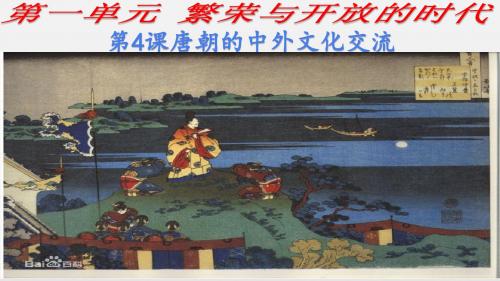
2. 通过对鉴真六次东渡、玄奘历时 18 年的西游中体现出 的精神的了解,激发学生积极上进、自强不息的精神动 力。 3. 通过对隋唐时期我国同亚洲各国,特别是日本和天竺 等国的友好往来情况的学习,启发学生思考隋唐时期出 现频繁交往高潮的主要原因。
遣 唐 使 印
遣唐使船
1 含义:为了学习中国的先进文化, 日本派遣使节到中国,当时称为“遣唐使”。 由官员、医师、画师、乐师、译师、史师,各类工匠等组成。
新罗引入中国医学、文 化、历算成就
朝鲜音乐传入中国
韩服的雏形于公元前1世纪至公元7世纪 的朝鲜半岛就已出现。
秋夜雨中
秋风唯苦吟,世路少知音, 窗外三更雨,灯前万里心。 崔致远 崔致远(857—— ?)
12岁来唐求学,18岁中 进士,在唐为官8年多, 884年以唐使身份归国, 被誉为韩国汉文学的开 山鼻祖,有“东国儒 宗”、“百世之师”的 称誉。
3.玄奘的重大贡献有哪些?
带回大量佛经;写成《大唐西域记》
玄奘为中印的文化交流作出了突出的 贡献。他是我国古代著名高僧、旅行家 和佛经翻译家”。
理由:
1、玄奘历尽险阻,到天竺求取佛经。 2、精通佛教经典,掌握了深奥的佛学理 论,并翻译了大量的佛经。 3、编写的《大唐西域记》是一部极其珍 贵的历史文献。
4. 复旦大学钱文忠教授在讲述唐朝对外关系时说:“一个伟大胜任西行取经的传 奇故事,一条由信念、坚持和智慧浇铸而成的求知之路,一个民族胸襟开放、海 纳百川的真实写照。” 材料四中的这位“伟大僧人”是谁?他的一生与佛学密不可分,他“求知”的最 高佛学府和为后世留下的经典著作分别是什么?
答:僧人:玄奘。 最高佛学府:那烂陀寺。 著作: 《大唐西域记》
1、时间: 唐太宗时期
日语课本翻译
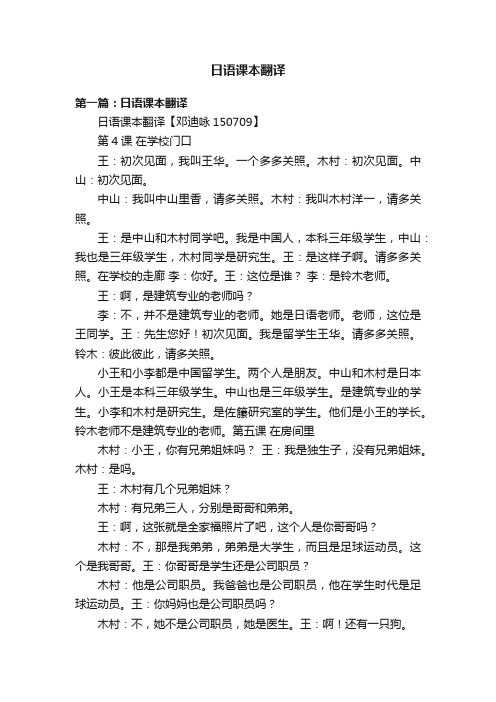
日语课本翻译第一篇:日语课本翻译日语课本翻译【邓迪咏150709】第4课在学校门口王:初次见面,我叫王华。
一个多多关照。
木村:初次见面。
中山:初次见面。
中山:我叫中山里香,请多关照。
木村:我叫木村洋一,请多关照。
王:是中山和木村同学吧。
我是中国人,本科三年级学生,中山:我也是三年级学生,木村同学是研究生。
王:是这样子啊。
请多多关照。
在学校的走廊李:你好。
王:这位是谁?李:是铃木老师。
王:啊,是建筑专业的老师吗?李:不,并不是建筑专业的老师。
她是日语老师。
老师,这位是王同学。
王:先生您好!初次见面。
我是留学生王华。
请多多关照。
铃木:彼此彼此,请多关照。
小王和小李都是中国留学生。
两个人是朋友。
中山和木村是日本人。
小王是本科三年级学生。
中山也是三年级学生。
是建筑专业的学生。
小李和木村是研究生。
是佐籘研究室的学生。
他们是小王的学长。
铃木老师不是建筑专业的老师。
第五课在房间里木村:小王,你有兄弟姐妹吗?王:我是独生子,没有兄弟姐妹。
木村:是吗。
王:木村有几个兄弟姐妹?木村:有兄弟三人,分别是哥哥和弟弟。
王:啊,这张就是全家福照片了吧,这个人是你哥哥吗?木村:不,那是我弟弟,弟弟是大学生,而且是足球运动员。
这个是我哥哥。
王:你哥哥是学生还是公司职员?木村:他是公司职员。
我爸爸也是公司职员,他在学生时代是足球运动员。
王:你妈妈也是公司职员吗?木村:不,她不是公司职员,她是医生。
王:啊!还有一只狗。
木村:是的,这只狗也是我们家的一员。
木村家里有五口人。
家里有父母还有哥哥和弟弟。
他父亲是公司职员,学生时代曾是足球运动员。
他母亲是医生。
他哥哥是公司职员,弟弟是大学生。
他的弟弟是足球运动员。
木村没有姐姐和妹妹。
不过,却有一只宠物狗。
这只狗也是家底一员。
第6课在学校佐籐:小王,这里是研究室。
李:我们总是在这里。
佐籐:这里有电脑和复印机等东西。
李:小王,那里是图书馆。
那个房间里有中国的杂志。
佐籐:图书室里也有电脑和复印机。
人教部编版七年级语文下册第4课《孙权劝学》课件(共25张PPT)

再读课文,读准读熟
初权谓吕蒙曰卿今当涂掌事不可不学蒙辞以 军中多务权曰孤岂欲卿治经为博士邪但当涉 猎见往事耳卿言多务孰若孤孤常读书自以为 大有所益蒙乃始就学及鲁肃过寻阳与蒙论议 大惊曰卿今者才略非复吴下阿蒙蒙曰士别三 日即更刮目相待大兄何见事之晚乎肃遂拜蒙 母结友而别
刮目相待,大兄何
见事之晚乎!
(吕蒙)
深感自豪 14
收获盘点
神宗说《资治通鉴》“鉴于往事,有资 于治道”,这篇文章对于我们今天的学习与 成长也很具有启发作用。文中哪个人物是你 的偶像?你从他身上获得了哪些做人或学习 方面的启迪?畅谈收获。
读书好,好读书,读好书。 ——冰心
课外阅读
阅读《三国演义》《三国志》 《资治通鉴》等书目,感受名著魅力。
卿今者才略,非复吴下阿蒙! 士别三日,即更刮目相待,大兄何见事之晚乎!
翻译五字法 留:国号、年号、地名、官名、人名、书 名等,可照录不翻译; 替:用现代汉语词语替换文言词语; 调:调整倒装句的语序,使之符合现代汉 语的习惯; 补:补出省略句中省略的内容; 删:删去没有实在意义的词。
孙权劝学 初,权谓吕蒙曰:“卿今当涂掌事,
孙权劝学 司马光
《资治通鉴》是司 马光主持编纂的一部 编年体通史,记载了 从战国到五代共1362 年间的史事。神宗以 其“鉴于往事,有资 于治道”,命名为 《资治通鉴》,即为 统治阶级提供政治借 鉴。
关于史书的小常识
• 通史:连贯的记叙各个时代的事实的史书。如 《史记》。
• 断代史:不连续的记载朝代历史。如《汉书》 《三国志》。
蒙何日阿“陽蒙書言但“蒙當初 母見,蒙卿,乃,多當孤辭塗, ,事即!今與始自務涉豈以掌權 結之更”者蒙就以,獵欲軍事謂 友晚刮蒙才論學為孰,卿中,呂 而乎目曰略議。大若見治多不蒙 別! 相 : , , 及 有 孤 往 經 務 可 曰 。” 待 “ 非 大 魯 所 ? 事 為 。 不 :
第4课《古代诗歌四首——观沧海》课件--部编版语文七年级上册

写作背景
《观沧海》是曹操的名篇,是他征乌桓时所作。曹操这次登碣 石山是在北征乌桓的途中。他大破盘踞在北方边塞地区的乌桓族 及袁绍残余势力,基本统一北方;九月,他在归途中经过碣石山, 写下这首诗。
乌桓是当时东北方的大患,建安十一年(公元206年),乌桓攻 破幽州,俘虏了汉民十余万户。同年,袁绍的儿子袁尚和袁熙又 勾结辽西乌桓首领蹋顿,屡次骚扰边境,以致曹操不得不在建安 十二年毅然北上征伐乌桓。在这年八月的一次大战中,曹操终于 取得决定性的胜利。这次胜利巩固了曹操的后方,所以第二年他 才能挥戈南下,以期实现统一中国的宏愿。把前后的事件联系起 来,我们可以看出,北征乌桓对曹操来说是一次多么重要的战争 了。身为主帅的曹操,登上当年秦皇、汉武也曾登过的碣石,又 当秋风萧瑟之际,他的心情一定会像沧海一样难以平静。他将自 己这种昂扬奋发的精神融会到诗里,借着大海的形象表现出来, 使这首诗具有一种雄浑苍劲的风格,成为一篇优秀的作品。
东临碣石,以观沧海。临:到达,登上 以:来。
水何澹澹,山岛竦峙。 何:多么。澹澹:水波荡漾的样子 竦峙:耸立。
树木丛生,百草丰茂。
秋风萧瑟,洪波涌起。 萧瑟:风吹草木的声音。 洪:大。
日月之行,若出其中。
星汉灿烂,若出其里。 星汉:银河。
幸甚至哉,歌以咏志。 幸:幸运。 甚:很,表程层意思?哪些诗句是写现实的?哪 些诗句是想像的?
1层(开头两句):交代观海的地点
2 层(3----8句):实写山岛、大海的状貌(和实景)
声势
3层(9---12表句现)大:海虚吞写吐日日月月和星星辰汉的气概。(虚写、 想象)
最后两句是附文,是为和乐而加,与诗的内容无关。
课堂练习:
1、填空 曹操,字---------,---------(时期) 著名的-----家,-------家,--------。
